Writing Comedy – Interview with Louis C.K.
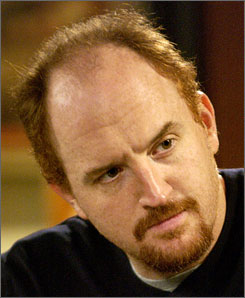
Louis C.K. in "Louie" on FX
I’ve hired a lot of writers… The more original, the more unique your stuff is, the better, I think, rather than trying to hit a certain place that’s going to get you employed. That usually just makes you like everybody else.
Continuing my coverage of FX Networks programming, I took part in a conference call interview with comedy veteran Louis C.K. who is premiering his new 30-minute comedy show “Louie” tonight.
Louis had some great insights into comedy writing and, for my money, elucidated the problem with network television and why it’s been getting its ass kicked by cable television for the past decade. Louis C.K.’s credits include Late Night with Conan O’Brien, “TV Funhouse” on Saturday Night Live, Lucky Louie on HBO and the cult hit movie Pootie Tang.
FX NETWORK: Louie
Premieres June 24, 2010/11:00 p.m. PDT
Dan Calvisi: You are listed as the only writer on IMDB. I don’t know if I missed some press materials where it lists other writers, but if that’s the case, what exactly is your writing process for writing these episodes?
Louis C.K. I am the only writer. That was a decision I made because I just wanted to write and make the show. Writers’ rooms, they kind of gravitate towards a certain place. There’s a need to perfect things in a writers’ room, and that can take a lot of fun out of a show sometimes. It’s a struggle. It depends on your personality. Some people love working with a writing staff. I had a great writing staff on Lucky Louie, but it sometimes felt like Congress or something. It’s like if you’re the president and you have the ability to just fire Congress, life would get kind of fun all of a sudden.
I remember when I got the green light to do this show, and my daughter was asking me about it. She was about seven at the time, and asked me, I don’t know why, she said, “Are you going to have writers on the show or are you going to write it all yourself?” And I said, “I think I might write them all myself.” And she said, “I think that would be easier because you don’t have to explain to all those people what you want to do. You can just do it.” And she was right. Seven years old, she was very savvy about production.
I am the only writer. That was a decision I made because I just wanted to write and make the show. Writers’ rooms, they kind of gravitate towards a certain place. There’s a need to perfect things in a writers’ room, and that can take a lot of fun out of a show sometimes.
So it does really make it easier. And again, like I said before, I can write stuff incomplete and start working on it. I don’t have to prove it to anybody. I like doing it that way. The writing process for me is different according to what I’m writing. With this show, I usually start with a moment or a scene or a feeling that’s funny to me, like these two people having a conversation. I want to see that. So I’ll write out that conversation that I want to see, or that moment, and sometimes it will just sort of lead into a story. Sometimes I’ll get interested in the voices I’m writing for and wonder what happens to them and then go find out, or the situation I’m writing about. Other times I have the conversation on paper and it stops being interesting, so I go, “That’s it. That’s done.” So we shoot that as a one off instead of a whole episode, or just one segment instead of a more chronological story.
Like the Ricky Gervais thing is an example of … doctors who you know personally who are inappropriately boundary-less during an exam. It was a very simple premise, and I could have done like, let’s flash back to us as kids, let’s see what happens, you know, a bunch of things. But I got Ricky in my head and wrote that out and it was done, and it just fit perfectly as a one act beginning and end, and then we did sort of a call back to it at the end with the phone call.
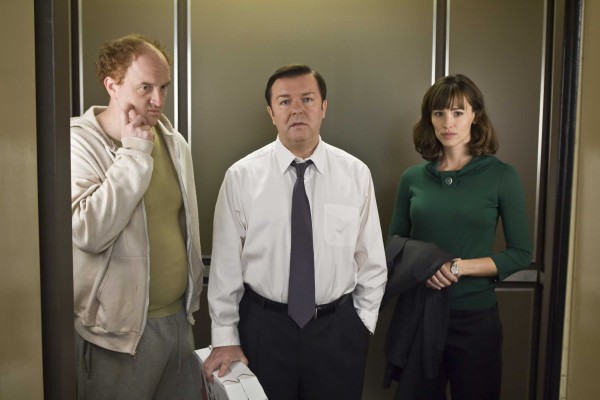
Louis C.K. with Ricky Gervais and Jennifer Garner in "The Invention of Lying"
So that got to be just exactly what it was. If I was working for a sitcom and I had a room full of writers we would all talk about, well, why are we doing this scene? Is it part of an episode about doctors? Does he get his comeuppance? That kind of painful bullshit. And then you’d actually probably throw it out, or you’d soften the scene. Somebody in the writers’ room would say, “That’s not very believable, so we have to find out why he’s like that,” and the fun starts to unravel. So what I do on this show is very much like what I do in stand up. I just throw it up there, work it for as long as it’s good, and then toss it.
There’s a huge amount of work that goes into placating a network in regular television. It’s literally 70% or 80% of your workload, is showing them the material, getting their notes and presenting it to them and making sure they weigh in. It’s a huge amount of work. And FX has deleted all of that from our workload, which has let us put way more time and energy into what we do…because literally the first time they see an idea is when it’s edited.
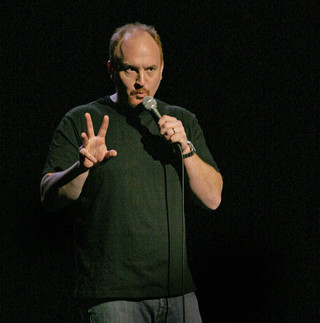
Louis C.K. performs his stand-up comedy.
Dan Calvisi: If I may ask, how many of these experiences, and maybe specifically the horrible dating experiences, come from your real life? Are you tapping past experiences?
Louis C.K. I like to think of the show as autobiographical fiction. It’s me, and it’s what my life feels like, but very few of these things have actually happened to me. I’ve never worn a suit on a date with a girl who wore a t-shirt, but I wanted to live those moments. I feel that way sometimes on dates, like I’m wearing a suit and she’s wearing a t-shirt. I feel like I make horrible train wreck decisions, like kissing a girl at the front door the way I did on that date. I don’t think I’ve ever done that, but I feel that way. That date definitely encompassed a lot of moments that I feel like I’ve had. I’ve never had a doctor like Ricky ever. I’ve definitely had play dates where the kids play and the grownups drink wine and smoke out the window, and let their hair down. That’s pretty common stuff, and it’s pretty much the only comfort you get in the world when you have kids in grade school, so I wanted to show that. So some yes, some no.
The people in the show, none of them match my real life. The girls in the show, my kids aren’t like that. I’ve got two great kids. They’re really engaging and they’re very sweet and they’re easy, but that’s not funny. So the only thing I take from my real daughter and gave to the fictional daughter is that she is reading constantly. She just shuts the world out and reads books, but that’s great. But yes, everybody else I make up. I wanted to be careful not to sort of draw pictures of people in my real life, because I’ve got to live with those people. So the parents that are like in the PTA scene, I don’t know anybody like that. Those are all people I made up.
Dan Calvisi: You’ve written for pretty much every genre of comedy on TV and film, Letterman, Conan O’Brien, SNL, sitcoms, movies with Chris Rock. What would be your advice for young comedy writers looking to break in? What genre, what kind of spec to write, just what advice in general about their career?
Louis C.K. Well, you have to be really tenacious. You have to keep at it. There are many roads to get there. If you can get yourself into Harvard, that’s a good way to go, because every Harvard graduating class, the agencies come trolling around and they’ll look for you. So if you go to Harvard, you’ll get found there. If you’re not that lucky or smart or rich, then I think making your own things is the best way now. Like making something; there’s nothing that beats proving you’re funny by making a funny thing, and right now there are huge outlets for that, with You Tube and all the other stuff online. You can get a good high def camera for very cheap, and you can buy a Mac book, put Final Cut Pro on it and you can make a whole TV show with those two items. I recommend some good microphones, because most little cameras don’t have good sound, but that’s how we’re making this show.
I edit this whole show myself on a Mac book. I loaded the footage into it from a Red camera that we shoot on, and I edit it on airplanes, sometimes, in the back of the concourse when I’m on the road. So anyone can do that. And if you make something really good and compelling and funny, people are going to watch it. And then if you back that up with some good material, some original—I don’t think that specs for sitcoms, they can get you jobs once you’re in the market for sitcom writing, but it’s hard to beat original material.
I’ve hired a lot of writers, and when I start reading a spec, when I open up page one, Raymond spec by Joey, I go, “I can’t read this. It’s painful.” Because there’s so many of them out there they all look the same. But when I read Talking Dogs, by Jessica Walter, whatever, oh, what the hell is that? And then I watch this person develop a whole group of people and tell a story, I think that gives you a better shot. The more original, the more unique your stuff is, the better, I think, rather than trying to hit a certain place that’s going to get you employed. That usually just makes you like everybody else.
Dan Calvisi: I remember seeing a short film that you did on black and white film, and I saw it on TV, maybe on the IFC channel or something. How did you use those shorts in the early part of your career to get work or get noticed?
Louis C.K. Well, it was so different back then. I think the one you’re talking about probably was called Ice Cream, and it was so different then, because I shot those on 16 mm film, like with real film crews, and they cost more than they do now to make those things. But at the time there wasn’t an Internet, and there wasn’t … When I made that thing, you had to actually write to a film festival. Like you had to go to the library and get a book that has all the film festival addresses in it. You had to write to film festivals and say, “Can you please send me an application.” And all these film festivals would send you applications and then you make VHS copies of all your stuff, of your film, and send it in and hope you get in.
That’s what I did with Ice Cream. I got into Sundance, I got really lucky. It was like the biggest deal of my life when I got that. Then I went out to Sundance and it got bought by European television stations, because in Europe they were showing short films. But Ice Cream started getting known, and that’s a good question, because Ice Cream ended up being what got me the Conan show job. Because when Conan was trolling for writers, I got asked about because I had a good reputation as a stand up, but the stand up only got me in the door. They said, “Do you have any material for writing?” and I gave them Ice Cream and said that this was the film I made. It wasn’t TV writing and it was certainly not late night writing. The other guys who got jobs there submitted jokes and little pieces for desk bits, but I gave them Ice Cream, and they said, “Well, if he can do that and he’s funny on stage, there’s probably a shot that he’ll contribute here.”
Dan Calvisi: Louis, just to show you the difference between the era when you made that film and now, I just looked up Ice Cream on You Tube and I’m watching it right now.
Louis C.K. I know. Exactly. That’s the way things are now. Now it’s just sitting on You Tube for anybody to watch. It’s funny to watch it now because the tone of it is not something that’s supported by today’s You Tube world. What short films on You Tube have become, and little bits and the stuff that people enjoy watching, Ice Cream is a slow paced, kind of really deadpan, dry as a bone, strange little film. It’s been on You Tube now for a few years, almost since You Tube started. I think something like 9,000 people have watched it. My dog fighting with the sprinkler, I put it on You Tube and three days later it had three million hits.
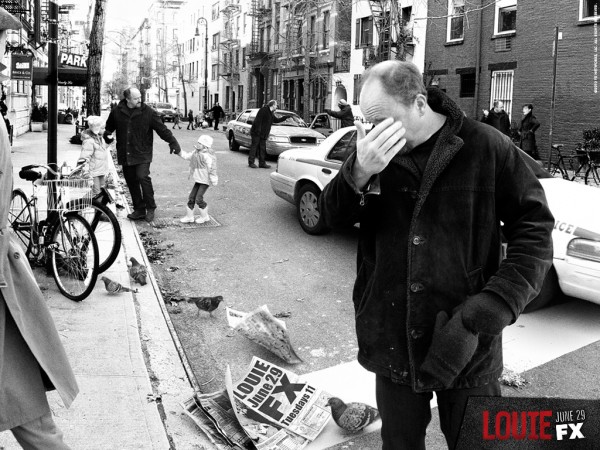
Louie on FX Networks Tuesdays at 11 P.M.
Additional questions from other reporters:
If a person comes up to you and just says, “Hey, what’s your show about?” and you have 30 seconds to pitch it to them, what do you say?
Louis C.K. I don’t know. I think I’d do what I’m doing now. I’d go, “Oh, I don’t know. It’s just me, and it’s funny. It’s just comedy. It’s comedy in many forms.” That’s all I would say about it, a lot of different kinds of comedy. I’ve learned how to be funny in about 20 different ways over the last five years. That’s less than one way a year, which is not that good, and I’m trying to use them all.
This show is like every idea I ever had all dumped into this show. This isn’t at all the answer to your question, but it just occurs to me I’ve got all these movie ideas of movies I wanted to write and make over the years, and a lot of them are in this show. I just hacked them up and made them ten minutes long and put them in the show.
What is it like working with FX?
Louis C.K. Yes, they’re pretty amazing. It don’t think I’ve ever heard of a situation like the one that I have right now. I mean, I never even heard of it. I’ve heard of networks that are very liberal, and I had what I thought was the best situation when I was at HBO. I never thought I could beat that. I remember after Lucky Louie was over that the main thought I had was, “I’ll never see that kind of creative freedom again.” But this is nuts, because they literally don’t know what I’m doing. They have no idea what I’m shooting, what I’m writing.
When I write stuff I just hand it to my line producer, Blair Breard, and she sets it in motion and we start shooting pieces, and that’s an amazing amount of freedom. Not only creatively, but like because my ideas get to be whatever, blah, blah, blah, but also it’s enabling for making the show. There’s a huge amount of work that goes into placating a network in regular television. It’s literally 70% or 80% of your workload, is showing them the material, getting their notes and presenting it to them and making sure they weigh in. It’s a huge amount of work. And FX has deleted all of that from our workload, which has let us put way more time and energy into what we do.
It also means I can do stuff like, sometimes I’ll write a scene, and I know that there’s more to it but I don’t know what it is yet. I can go ahead and produce it, and shoot it, which is crazily irresponsible if anybody is watching you. Like, I’ll write one scene with me in a character not being sure why it’s there, and then once I’m shooting it I’ll think of the next scene and get that one going. So I’m able to do that and let stuff grow really organically. The hard thing about work in TV, even at its best, is that you have to prove yourself. You have to complete something on paper before you are allowed to execute it. And with FX, that doesn’t exist, because literally the first time they see an idea is when it’s edited.
I know that I’m earning that right with every episode. If I turn in two bad episodes in a row, they’ll come visit me and they’ll want to read the scripts and they’ll want to visit the set. They have that right, contractually, but they’ve laid off so far because they’re happy with what they’re getting this way, which is that they leave me alone.
One of the things that really stands out with this for me is it’s a real sense of place with New York. How important was it that the city could be almost another character more than just a backdrop?
Louis C.K. Absolutely, I very much wanted that and I’m glad it came across. I love New York City very much. I love New York City in the way immigrants love America, like more than the natives. Well, natives, that’s not fair because they’re all gone now, but meaning that I was rescued from the city of Boston by New York City, so I thank whatever every day for New York City. I love it. I don’t think it gets seen for what it is very often, because the New York that I love are the greasy wall pizza places and the Lower East Side, and places like that. So I wanted to show that. You know, Sex in the City, there’s a lot of sort of wet street beauty shots of New York, but you don’t really get to see the New York that everybody inhabits. You don’t see the subway a lot.
And to me, part of what I loved about the idea of this project was that, the way I looked at it was, I’m going to California and conning these people out of $3.6 million of Hollywood money that would have just sat there. That’s the thing about these shows. If I hadn’t pitched the show and it hadn’t worked, it’s not like the money would have gone elsewhere, it just would have sat there in whoever, Rupert Murdoch’s house, I don’t know where it is or lays. But I stole this money from them and took it to New York and we’ve injected it into the New York economy, and we’re using a lot of crew people that I’ve worked with for years in New York that I’m really happy to be employing in this. New York is just infested with great actors that are just laying around, and we paid very little, but we got some of the best actors there are in the city, and they were eager and loving to work with us.
The personnel we used in the city was great. And yes, we really wanted to see the city for what it is, and what it’s like to just sort of muddle through it. You know, a year of life in New York City. That was a big part of it for me.
Thanks Louis!
Good Luck and Happy Writing,
Dan Calvisi

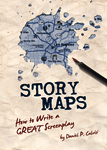
Great interview- thank you so mcuh.